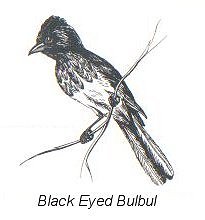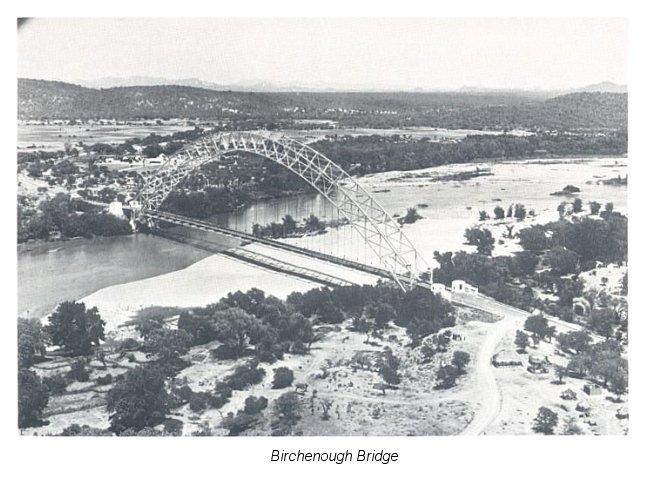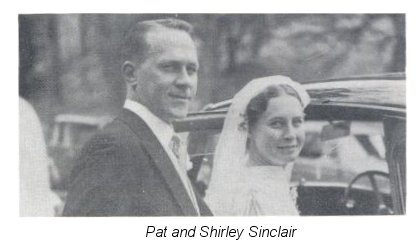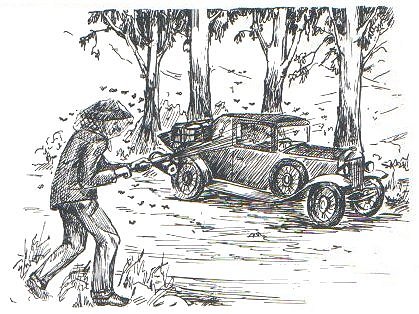
In March 1934 a large leopard was seen disposing of a goat on the road
opposite Lindley, and Abraham Olwage went to the spot with some natives and two
small dogs. He stood in the road while the dogs went into the bush after the
leopard and when it charged with them over the embankment Olwage was caught up
in the rush. He was knocked over, his hands and arms were lacerated by the
leopard, and his rifle slipped to the ground.
While the dogs continued to worry the leopard Olwage had time to recover
and fire, but it escaped after also wounding both dogs severely. Olwage was
taken to Umtali hospital, where he had one finger amputated and the other wounds
treated during the six months he had to spend there.
Coffee was grown regularly in small quantities on many farms for home
use; J. L. Martin for many years reaped a very good annual crop from his little
plantation, and Allott had 100% success with seedbeds of Caffea Arabica and
planted out 1 000 trees in 1934.
Hanmer planted his first 1 000 apple trees on Fairview, and expanded
his orchards over the years. He had very good results from apple sales and
turned the surplus into cider, which seemed so innocuous and was so pleasant in
flavour that its potency was frequently not immediately realised. In December
local wireless enthusiasts listened in to the Duke of Kent�s wedding, which
despite rainy weather was clearly and distinctly heard.
From 1935 Melsetter�s most senior Government official was the Assistant
Native Commissioner. That year the Allotts decided to run the hotel themselves:
they had had no previous experience, but won a good reputation. They installed
electricity, erected ten prefab bedrooms which had been the living quarters
during the building of Birchenough Bridge, and in 1938 put in the swimming bath,
put up a private telephone line between the hotel and Belmont, and built the new
diningroom where dances were then always held although concerts and plays were
still put on in the Memorial Hall.

The Allotts had a dance band of local talent, with up to six different
instruments, which was in great demand for all dances in the district. The
Umtali Advertiser reported on a delightful evening spent by tourists at a
well-organised dance with a band better than many in more sophisticated parts; a
sketch was charmingly interpreted by Josie and Rosemary Allott, and the song was
delivered in good voice by Bert Pike, and an encore demanded by a delighted and
surprised audience. A bushbuck once wandered into the lounge, got frightened,
and jumped through a closed window: as it was badly maimed it had to be
shot.
Consideration was again given to a road through the Chimanimani Pass to
connect Melsetter with Vila Pery, and John Martin took the Minister of Finance
and the Postmaster-General on horseback to view the proposed route, but no
further move was made.
On Albany Captain W. H. Boshoff reported a phenomenal infestation of
snakes which had attacked cows, and �one milch cow was bitten in the udder seven
times and recovered completely eacn time under treatment with paraffin and
Condy�s crystals.� In two weeks more than 20 snakes were killed, and Boshoff
thought that an even greater number had escaped.
In June 1935 there was an unusually severe frost in the Nyahode valley,
and in August snow fell on Fairview and Sawerombi.
For years Melsetter and Chipinga farmers, supported by Umtali industry,
municipality and agriculture, pressed for a proper outlet across the Sabi River,
which was, at risk, fordable for only four months of the year. In 1931 a site
was selected for a bridge estimated to cost �30 000, but the Government had no
funds, so the Beit Railway Trust was approached, Sir James McDonald visited
Melsetter, and the case was put to him by residents. A local Committee then
circulated the whole Eastern Districts asking for letters, facts, or any support
in order to furnish the Trustees with a complete statement of the benefits that
would accrue.
Helpful memoranda and facts were received and the Committee sent full
details regarding population and farming, with Miss Cruikshank�s exhibit, to
London. An engineer visited the Sabi, and in 1934 it was formally announced that
the Beit Railway Trust would build the bridge, and work was begun. Meantime
Melsetter pressed for a road via Fairfield and Admiral so that benefit might be
derived from the bridge, but apart from a very rough track to the 85 mile peg on
the Sabi road nothing was done. In December 1935 the Birchenough Bridge was
opened, then the third longest single span bridge in the world.
1936 started off brightly: there had been no A.C.F. cases since early
1932 and restrictions had been lifted in 1935, but hopes were dashed with fresh
outbreaks on Lavina�s Rust and Bok Kraal.
A meeting of all Eastern District Farmers� Associations pressed the
need for more veterinary staff . The C.V.S. said that some relief was being
arranged for Melsetter whereby guard area cattle would be allowed to travel
under certain conditions, and he thanked the Melsetter Veterinary Advisory Board
for their assistance.
Cattle sent to Umtali for slaughter were quarantined for 14 days before
departure and objections were made to their detention for a second inspection at
Mpudzi, where there was sometimes a three-day delay in a place devoid of grazing
with a resultant serious loss of condition. Representations were made for a
return to the previous custom of walking them straight through to Umtali, but it
was not until 1942, when wartime petrol rationing restricted travel, that
inspection at the Mpudzi was cancelled.
In spite of drawbacks there was an improvement in cattle prices, and
oxen were sold for �5 to �6.10 each.
An exhibit from Melsetter at the Empire
Exhibition in Johannesburg included tea, wool, cheese, wheat, bottled fruit and
native craftwork. A bale of Fairview wool created such a favourable impression
that enquiries resulted regarding the price of land in the district.

Some cases of diphtheria among the Africans on the Commonage caused
concern, but inoculations were carried out and the epidemic was soon cleared
up.
Concrete beacons, numbers 48A to 76, were erected on the boundary with
P.E.A. In November a cloudburst on Moodie�s Nek resulted in the Tandaai river
rising 30�.
Dr. J. P. Ziervogel bought Orange Grove and Roede for his son, who was
killed a few years later in the War. His manager, S. M. (Pat) Sinclair, set up
camp on Orange Grove, and spent the next few months fencing, buying cattle,
planting pastures, buying sheep �including 600 at 8/6d each from Koos Papenfus �
and importing two Corriedale rams. Schalk Kloppers built the stone house, and
Giellie Bredenkamp took over the farm management while Pat went off to get
married, when he returned with Shirley.
Bees
have frequently been a hazard. In January 1937 they swarmed in the
roof of the Veterinary offices, and D. V. S. Nixon arranged for them to be
smoked out one night, and the building caught fire and was destroyed; it was
later rebuilt. The Umtali Advertiser reported that all furniture and records
were saved, but the reply to a recent
request for access to old records was
that they were all burned in Nicky�s fire.

A bee invasion occurred when John Olivey drove in to load his wool:
when the bees swarmed the R.M.S. driver abandoned the trailer and drove his
lorry away to Umtali, the village was as if deserted with all houses closed and
not a soul in sight, and John�s car stood abandoned with the swarm settled on
his wool bale. Bert Pike, then Postmaster, thought that with the aid of a small
piece of mosquito netting and a flit pump he would be able to disperse the
little devils, but they soon fixed him with a sting on the point of his chin.
Exit the Postmaster. The Post Office had to be locked up by the office messenger
and the keys taken over to the house, and no postal services were available for
that day. John managed to shed the bale, acquired some sacks for protecting his
head and arms, and drove round the village like a Ku Klux Klan figure.

The Post Office consisted of two rooms, one with the counter and the
inner one with the safe and telephone and telegraph apparatus. The telephone
line connected with Chipinga and Umtali direct. Most people called for mail:
there were no private boxes, but there were a few Private Bags. Mail sorting, at
very erratic hours depending on the lorry�s arrival, was very frequently done by
lamplight after dark.
During the Coronation celebrations F. E. Cronwright was warmly
congratulated by all on receiving a Coronation Medal for services rendered to
Melsetter. He was a quiet retiring man, full of the wisdom of experience, and
always turned away from any unpleasantness but was always ready to help.
It was hoped that the name Melsetter Waterfall would be kept for this
scenic attraction and the V.M.B. said that those who called it Bridal Veil
should be corrected, but this was a losing battle as much publicity had been
received for the Bridal Veil Falls. The V.M.B. looked after the site, and bought
the iron scat which is still there for �4 in 1937. They also spent �3 on
repairing the road from the hotel to the Orange Grove commonage gate, and the
Roads Department built the road to van Bilion�s farm Orals Krantz.
A memorandum was submitted to the Government on the plight of the
Melsetter Chipinga area, detailing the hardships which had so often previously
been mentioned, and appealing for assistance including long-term loans for
fencing.